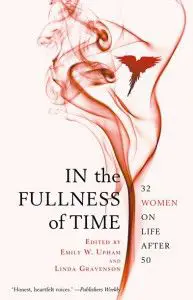
As she puts it, “The generation of women forged by the 1960s, the “youth” generation, is now facing the death of parents, friends, and spouses, the loss of health, of sexual power, of power in the workplace, of dreams, of time remaining.”
She points out that we came of age at a fleeting moment in history when traditional expectations were tossed aside, and as such, we are a maples generation. As we age and begin to suffer the losses common to us all, we have no compass to chart our lives by, as our lives are very different than those of women who marched before us, as well as those of those who follow us.
Upham reached out to her friend, Linda Gravenson, and together they assembled this anthology of original writings authored by 32 extremely gifted American writers and artists for your reading pleasure.
The authors have one common identity: they are Baby Boomers writing about what each of them has lost and how each has adjusted her life to go on living.
As you read it, however, despite the theme being loss, you will find it is frequently amusing, always inspiring, and definitely worth reading. You’ll find yourself in total agreement with co-editor Linda Gravenson who writes of the authors: “These are the women I’d want in my lifeboat.”
Gravenson, by the way, authored of one of the book’s Moving essays. In it she shares her crazy and confusing childhood-to-adulthood relationship with her dangerously mentally ill mother, and her feelings after her mother dies.
Any of us who has also lived with a parent who is not entirely supportive will understand where she is coming from when she writes: “My relationship with my mother keeps getting better and better. I can approach her now and take from the family album what I need. I can even return to the mischievous little girl who runs wildly around the garden as her mother holds out a sweater, insisting on protection from the evening chill. I am shrieking with glee as I skip just ahead of her, proud of my speed, and happy to be fooling around with my mom.”
There’s no boilerplate in this book, all of the essays were written just for this publication. The authors range in age from fifty-five to a hundred and one. They have all been “immersed in, or have emerged from, maelstroms of change.”
But this book is not only about the more predictable kinds of losses that face us as we age, for example, the loss of spouses and lifelong friends. No, you’ll be delighted to find recognition of loss in all flavors and formats. Among them:
You’ll want these women in your lifeboat, as well. Especially since, as Upham notes, “one of the great gifts of experience, however, is the ability to choose – not our circumstances but how we interpret them. I have come to focus the lens of my inner camera and to see things differently, thanks in large part to the words of the admirable women gathered here.”
You will too.
Notifications